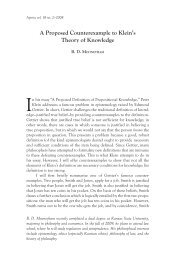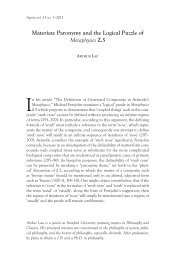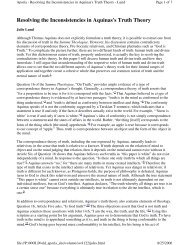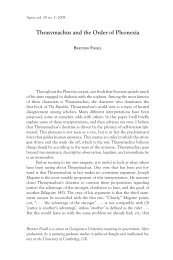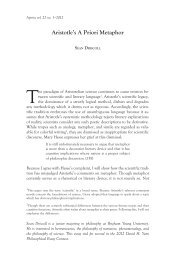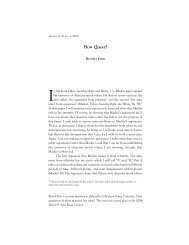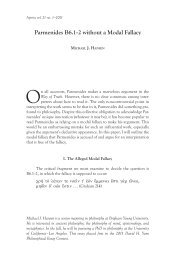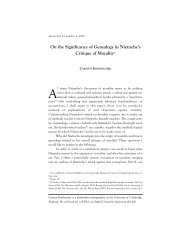Hermeneutics after Kant - Aporia - Brigham Young University
Hermeneutics after Kant - Aporia - Brigham Young University
Hermeneutics after Kant - Aporia - Brigham Young University
Create successful ePaper yourself
Turn your PDF publications into a flip-book with our unique Google optimized e-Paper software.
86<br />
Nate NoorlaNder<br />
to understand what an author is trying to say. But even once we feel we’ve<br />
achieved some clarity, it isn’t necessarily clear what his point means in<br />
different contexts.<br />
Gadamer shows us that a text says nothing without a reader; what the<br />
text says, or what it means, is a result of what happens when the text is read.<br />
Gadamer was able to see the difference between knowledge in the human<br />
sciences and knowledge in the natural sciences more clearly than Schleiermacher<br />
was: knowledge in the human sciences, specifically in hermeneutics,<br />
does not consist of correspondence between the mind and the world,<br />
nor does it result from any rigorous method. Rather, hermeneutic knowledge<br />
results from an appropriate instance of application to tradition. Like<br />
Heidegger, who held that to know something is to be able to work with it<br />
practically, Gadamer claims that we know the meaning of a text when we<br />
can appropriately apply it to our tradition. As literary critic Allan Bloom<br />
has said,<br />
Prejudices . . . are visions about the way things<br />
are. They are divinations of the order of the whole<br />
of things, and hence the road to a knowledge of<br />
that whole is by way of erroneous opinions about<br />
it. Error is indeed our enemy, but it alone points<br />
to the truth and therefore deserves our respectful<br />
treatment. The mind that has no prejudices at the<br />
outset is empty. It can only have been constituted<br />
by a method that is unaware of how difficult it is to<br />
recognize that a prejudice is a prejudice. (43)<br />
In other words, the notion of a mind without prejudices, or an objective<br />
standpoint, is fantasy. It cannot be achieved, and thus the notion of an<br />
objectively discoverable text is unintelligible. The most accurate model of<br />
textual interpretation understands prejudice, tradition, and context not<br />
as obstacles to be overcome, but as necessary conditions for hermeneutic<br />
knowledge.



